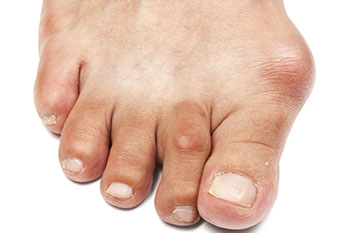
A bunion is a common foot deformity characterized by a bony bump appearing at the base of the big toe joint. This bump tends to progressively worsen over time if left untreated, growing larger and pushing the big toe out of alignment. Beyond altering the physical appearance of the feet, bunions can also become painful, swollen, tender, and inflamed, making wearing shoes and walking uncomfortable.
Bunions are thought to be caused by genetics. Various structural and biomechanical differences in the feet can be inherited and make bunions more likely to develop over time. Wearing shoes that are too tight and crowd the toes can make existing bunions progressively worsen. Having rheumatoid arthritis can also increase your risk of developing bunions over time.
Bunions can be diagnosed by a podiatrist through physically examining the foot. Sometimes, an X-ray may also be ordered to assess the extent of the deformity. Conservative treatments, such as wearing shoes with a wide toe box or custom orthotics, padding the bunion, and resting and icing the foot can stop the bunion from worsening. Surgery may be recommended to correct more severe bunions. If you have bunions, please see a podiatrist for treatment.
